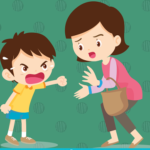Hidden anger issues in kids can be elusive, often concealed beneath the surface of their everyday actions. Recognizing and addressing these issues early are crucial for the child’s emotional well-being. In this article, we’ll delve into the subtle signs, common triggers, and proactive measures parents can take.
Signs of Hidden Anger in Children
Understanding the signs of hidden anger in kids is pivotal for parents. Behavioral changes, physical symptoms, and academic challenges can all be indicators that a child is grappling with unexpressed anger.
Common Triggers in Kids
Kids, much like adults, can experience anger when their needs go unmet, communication breaks down, or they face environmental stressors. Identifying these triggers is the first step in addressing hidden anger.
Impact on Mental Health
Unaddressed hidden anger in children is linked to anxiety and depression, emphasizing the urgency of intervention. The long-term consequences can extend into adulthood, affecting various aspects of their lives.
Parental Guidance and Early Intervention
Parents play a crucial role in recognizing signs of hidden anger. Open communication and early intervention, whether through parental guidance or seeking professional help, can make a significant difference.
Building Emotional Intelligence in Children
Teaching children healthy ways to express their emotions and fostering self-awareness are essential components of building emotional intelligence. These skills empower kids to navigate their feelings effectively.
Creating a Supportive Environment
Family dynamics significantly influence a child’s emotional well-being. Establishing a safe space where a child feels heard and understood is key to addressing hidden anger issues.
Preventive Measures
Promoting mental well-being and incorporating emotional education into a child’s routine are preventive measures that contribute to a healthier emotional landscape.
The Role of Schools and Teachers
Educators can play a vital role in recognizing signs of hidden anger in the classroom. Collaborating with parents ensures holistic support for the child’s emotional needs.
Therapeutic Approaches for Kids
Therapeutic approaches, such as play therapy and cognitive-behavioral therapy for children, provide effective ways to address hidden anger and help children express themselves.
Parent-Child Activities to Foster Communication
Bonding activities and trust-building exercises create an environment where children feel comfortable expressing their emotions.
Navigating Challenges: A Case Study
Examining real-life examples of hidden anger in kids and successful intervention strategies provides insights into the complexities parents may face.
The Importance of Patience
Addressing hidden anger in children is a gradual process. Celebrating small victories and having patience are vital aspects of supporting a child through behavioral changes.
Empowering Kids Through Expression
Providing creative outlets for emotions and encouraging hobbies can empower kids to express themselves in healthy ways.
Conclusion
In conclusion, unmasking hidden anger issues in kids requires a proactive and patient approach from parents and educators. By recognizing signs early, fostering open communication, and providing a supportive environment, we empower children to navigate their emotions successfully.
Frequently Asked Questions (FAQs)
- Are hidden anger issues common in children?
- Yes, hidden anger issues are not uncommon in children and can manifest in various ways.
- How can parents differentiate between normal anger and hidden anger in kids?
- Behavioral changes, physical symptoms, and prolonged patterns can indicate hidden anger.
- When should parents seek professional help for their child’s anger issues?
- If a child’s anger significantly impacts their daily life or persists over time, seeking professional help is advisable.
- Can hidden anger in children affect their academic performance?
- Yes, hidden anger may manifest in academic challenges, affecting a child’s performance.
- What are some immediate steps parents can take when they suspect hidden anger in their child?
- Initiate open communication, actively listen to the child, and consider seeking guidance from a child psychologist.




